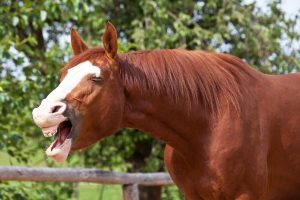Horses Smarter than Previously Thought, Study Suggests
From Equine Science Update:
Horses are more intelligent than previously believed, according to a new study that shows how they cleverly adapted their behaviour to maximise rewards with minimal effort.
Researchers at Nottingham Trent University sought to understand more about equine learning processes, as this knowledge could lead to more humane training methods and improved welfare for horses. A full report of the study is published in the journal Applied Animal Behaviour Science.
The study involved twenty horses, aged 11 to 22 years, including seven females and thirteen castrated males of mixed breeds.
The team devised a task where horses had to touch a piece of card with their nose to receive a treat. They then made the task more challenging. Horses would not get a treat if they touched the card while a bright white “stop” light was on but would do if they touched it while the light was off.
As the task was made more challenging, the horses initially struggled, indiscriminately touching the card whether a light was on or off, though they continued to receive rewards for correct responses.
In the final stage, a penalty was introduced: touching the card when a “stop” light was on resulted in a ten-second timeout during which no rewards could be earned. Remarkably, the horses quickly adapted, showing a significant reduction in errors and only touching the card at the correct times to receive treats.
The researchers suggest that rather than misunderstanding the game, the horses may have understood it all along but found a way to play that required less attention. They suggest that their findings indicate a higher level of cognitive processing than was previously thought possible, as the horses instantly switched strategies when faced with the risk of losing rewards.
This approach requires the horse to think into the future, the researchers say, and is very goal directed, with horses required to focus on what they want to achieve and the steps they need to take to do this.
This, they argue, is something which has previously been considered beyond a horse’s cognitive capacity.
“At first we found that horses would just keep touching the card over and over, as they probably realised they would still get a frequent reward with minimal mental effort,” said lead researcher Dr Carrie Ijichi.
She said: “There was no cost for indiscriminate hitting, sometimes it paid off, sometimes it didn’t. When we introduced a cost for their errors, however, they could instantly understand and play the game properly.
“Horses are not natural geniuses, they are thought of as mediocre, but this study shows they’re not average and are in fact more cognitively advanced than we give them credit for.
“We now think that horses may be able to use a form of learning called ‘model-based learning’ which was thought to be too complex for them. This will now help us to understand their behaviour and capabilities much better.
“It’s fascinating because they have a very underdeveloped pre-frontal cortex which is what we typically credit with producing that type of thinking in humans. This means they must be using another area of the brain to achieve a similar result and this teaches us that we shouldn’t make assumptions about animal intelligence or sentience based on whether they are ‘built’ just like us.”
Researcher Louise Evans, based in Nottingham Trent University’s School of Animal, Rural and Environmental Sciences, said: “We were expecting horses’ performance to improve when we introduced the time-out, but were surprised by how immediate and significant the improvement was.
“Animals usually need several repetitions of a task to gradually acquire new knowledge, whereas our horses immediately improved when we introduced a cost for errors. This suggests that the horses knew all along what the rules of the game were.”
For more details, see:
Louise Evans, Heather Cameron-Whytock, Carrie Ijichi,
Whoa, No-Go: Evidence consistent with model-based strategy use in horses during an inhibitory task,
Applied Animal Behaviour Science, (2024) Vol 277, 106339,











